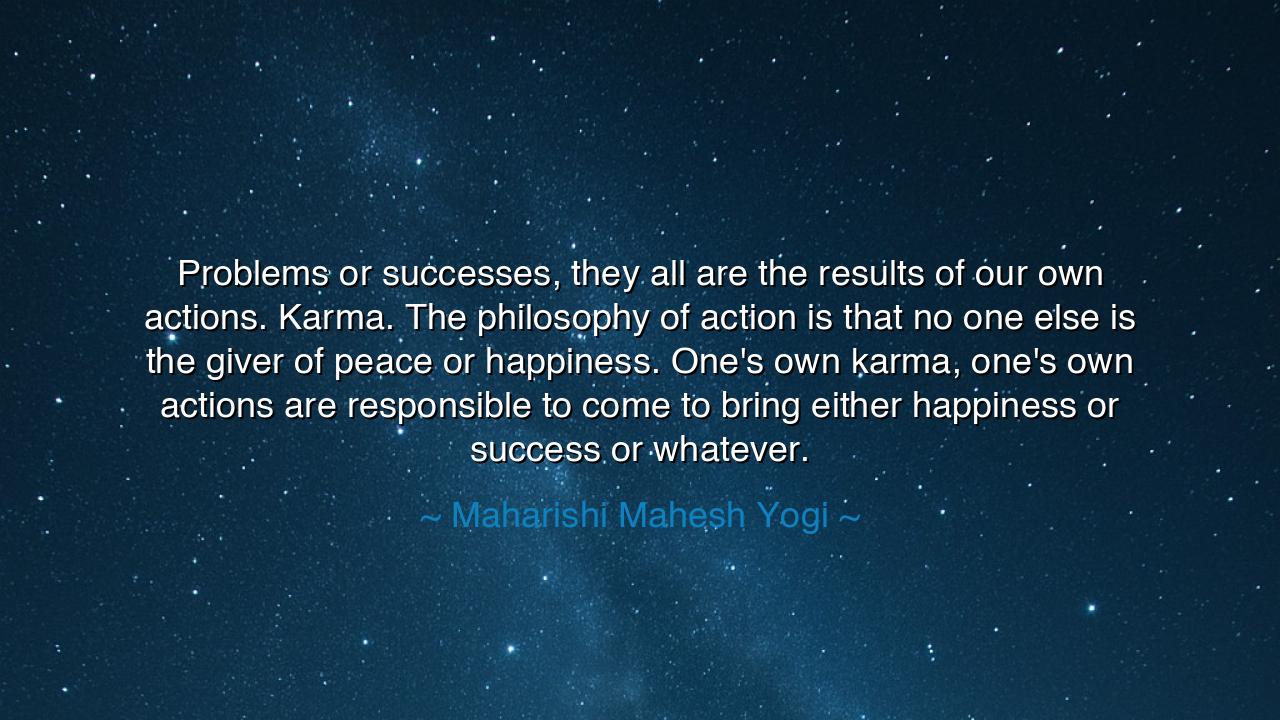
Problems or successes, they all are the results of our own
Problems or successes, they all are the results of our own actions. Karma. The philosophy of action is that no one else is the giver of peace or happiness. One's own karma, one's own actions are responsible to come to bring either happiness or success or whatever.






In the words of Maharishi Mahesh Yogi, “Problems or successes, they all are the results of our own actions. Karma. The philosophy of action is that no one else is the giver of peace or happiness. One’s own karma, one’s own actions are responsible to bring either happiness or success or whatever,” we hear a truth as ancient as the mountains and as unchanging as the stars. These words flow from the wellspring of Vedic wisdom, where the law of karma — the law of cause and effect — governs not only the external world but the hidden world of the soul. In this teaching, the Maharishi reminds us that man is not the helpless victim of fate or circumstance; he is the architect of his destiny, the weaver of his joy and his sorrow alike.
The origin of this wisdom lies deep within the spiritual traditions of India, where karma is understood as the eternal rhythm of the universe — the balancing force that binds action and consequence. Every thought, every word, every deed sets forth ripples that return to us, shaping our future and our state of being. The Maharishi, who brought meditation and Vedic philosophy to the modern world, saw that this principle was not merely metaphysical but profoundly practical. He taught that peace, happiness, and success are not gifts bestowed by others, nor accidents of fortune, but the natural harvest of our own sowing. What we plant in thought and action, we shall one day reap in experience.
To live by this truth demands both humility and power — humility, to acknowledge that our suffering is not always caused by others, and power, to recognize that we hold the means to change it. The weak blame the world; the wise examine themselves. This is not punishment, but liberation, for it returns control to where it belongs — within the heart. When we see that our karma is the root of both our struggles and our triumphs, we no longer wait for others to deliver peace; we create it. This is the philosophy of action — that every moment offers a chance to begin anew, to sow better seeds, to shape the destiny we desire.
This truth has echoed across the centuries in the lives of the great. Consider the story of Emperor Ashoka, the mighty ruler of India who once bathed his empire in war. After the bloodshed of Kalinga, his heart was shattered by remorse. In that moment of despair, he turned inward and saw that his suffering was not the work of his enemies, but the reflection of his own deeds — his karma. Renouncing conquest, he embraced the path of righteousness, spreading peace, compassion, and wisdom throughout his realm. His empire endured not by the sword, but by the power of transformation — proof that when we change our actions, we change the world around us.
So too in every human life, this law unfolds. The man who acts with anger breeds conflict; the one who acts with kindness finds peace. The student who labors with patience and discipline earns mastery, while the idle one curses fate. Even the smallest act — a word of love, a gesture of generosity, a moment of forgiveness — sends forth energy that one day returns. Thus, the Maharishi teaches that we are each the givers of our own happiness, and no hand but ours can write the script of our lives. The universe is just; it mirrors us perfectly, rewarding not prayer alone, but action aligned with truth.
Yet, this teaching is not harsh; it is filled with mercy. For if we are responsible for our own suffering, we are also capable of healing it. Every breath offers a new beginning. The past may bind






AAdministratorAdministrator
Welcome, honored guests. Please leave a comment, we will respond soon